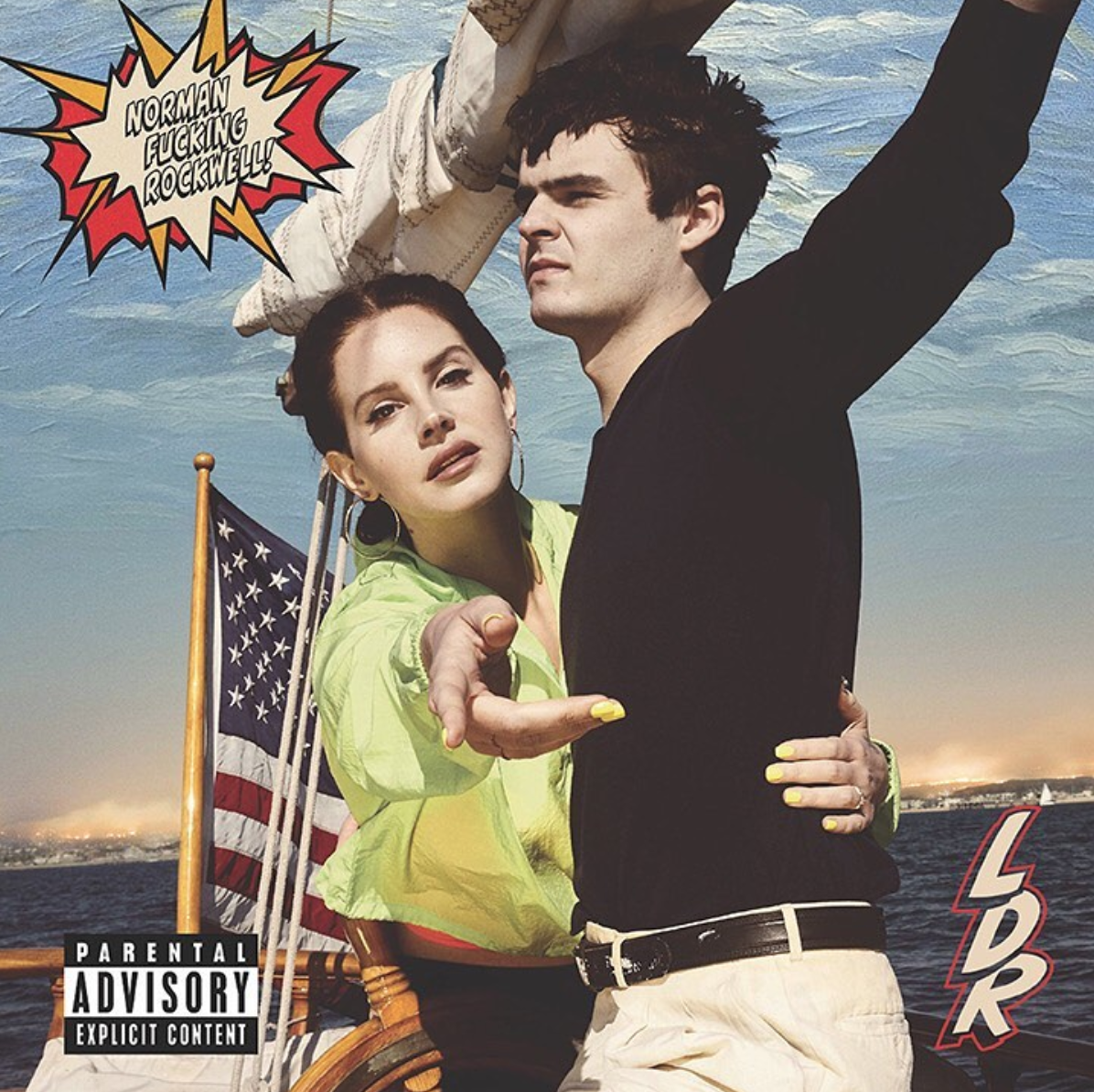As Lana Del Rey stans proceed to attempt picking the wigs that were snatched up off the floor after getting an official release date and album cover for the Mistress of Neo-goth’s sixth record, it bears noting that, just as we thought Lust for Life once was (with its bizarrely anathema smilingness), this cover is distinctly different from all the others she’s presented us with.
While some might not only be scratching their heads as to who the tall dark stranger on the cover (naturally, taken by Del Rey’s sister, Chuck Grant) with Lana is, they might then subsequently wonder why, of all people, it is Jack Nicholson’s grandson, Duke, that the chanteuse handpicked to “just ride” by her side. But oh how it makes total sense when considering LDR’s current nihilism. A dark perspective that unfolded on the ironically titled Lust for Life, released in the summer of 2017, months after Trump officially took hold of the White House in January. Designed to serve as something of a capsule that could one day be a “sign o’ the times,” tracks like “When The World Was At War We Kept On Dancing” and “Change” offered a glimpse into Del Rey’s dichotomously hopeless and hopeful state over the world around her. But where Lust for Life was, indeed, undeniably tinged with positivity in the face of overwhelming adversity, Norman Fucking Rockwell appears, already, to be more imbued with cartoonish realism. Literally–for the font of Norman Fucking Rockwell is right out of a comic book/Lichtenstein painting (along with the “LDR” vertically etched on the bottom right corner).
But oh yes, back to Duke being on the boat with her. It isn’t a non sequitur, particularly when factoring in his Nicholsonian lineage. Of being forever associated with an actor who made the anarchic characters of Jack Torrance and Mac McMurphy (both based on iconic anti-heroes of novels in their own right) come to rebellious life–though some might not exactly call Torrance a “rebel” so much as a male made unhinged by the societal pressures of being the perfect “family man” (another nod to the Norman Rockwell connection here). That the sky in the background is presented with painterly brushstrokes as it segues into a burning California shoreline (likely inspired by the intense wildfires that plagued Del Rey’s precious honorary state in 2017) is telling of Del Rey’s worldview at the moment–trapped somewhere between remembering all the beauty of the world (à la Ricky Fitts in American Beauty) and being daily presented with such images as Boris Johnson taking over as the U.K.’s prime minister.
Reaching her hand out to us as though to say, “Here, I’ll save you–I’m the only lifeline you’ve got left in this century,” Del Rey echoes the “Mariners Apartment Complex” lyrics that assure, “You lose your way, just take my hand/You’re lost at sea, then I’ll command your boat to me again.” Which is precisely what she seems to be doing with Duke at her side. Unfazed by the chaos around him, he represents the average youth of now, immune to shock thanks to the internet (here’s looking at you, Billie Eilish) and the occurrences of such “what might have once been” satirical events as the U.S. president chucking paper towels at hurricane victims in Puerto Rico. Mass shootings on the regular, of course, also contribute to a certain nonplussedness about much of anything that happens anymore (as Del Rey once put it, “Nothing scares me anymore”). So what’s the big “to-do” about a burning coast, to boot? The whole world is going up in flames, after all.
The presence of the American flag, an emblem Del Rey once proudly seemed to parade as a classic symbol of Americana–of a time that once saw the U.S. as a world leader instead of world loser–also looms behind as something of a mockery, mostly obscured by the vibrant green hue of Del Rey’s top (the color of money, which she long ago asserted to us was the national anthem). The once clout-holding “Parental Advisory Explicit Content” sticker also jumps out as more of a sendup than an actual warning. A parody of a period in American culture when the notion of “kids” being protected from the big bad wolf called mass culture was actually in the realm of the plausible (at least in suburban milieus like Del Rey’s own Lake Placid–where she, incidentally, became an alcoholic) as opposed to the laughable.
The back cover provides a toned down tongue-in-cheek iteration of the front, with a lone Duke (also fittingly tied to Del Rey for the fact that “Duke” was John Wayne’s nickname) holding onto the back rail of the sailboat (though it doesn’t seem Del Rey is making a dig at what a rich white people sport sailing is–unless, that is, she’s alluding to how only rich people will be spared from the inevitable destruction of Earth) looking more like old Jackie boy than he does on the front–and still packing a decidedly non-expression. Because that it is what it is to live in the anti-Norman Rockwell era of the present. There is no expression–least of all a smiling one–to be had. No “loving” depiction of family and America to be sold. But maybe, just maybe, Del Rey seems to be saying, if you take the hand of her music, she can save you from your own sins.



















